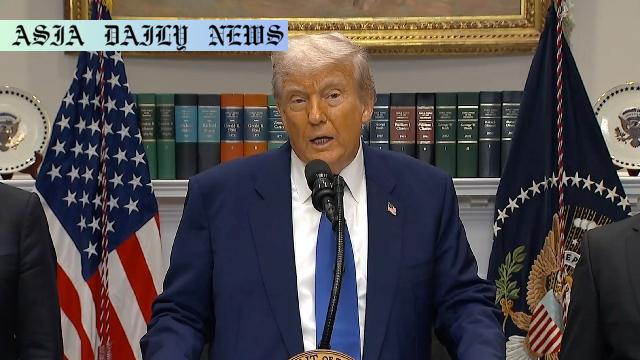Mediation may take place as Trump hints at potential intervention in Ukraine-Russia talks amidst tensions and proposed Istanbul meeting.

Trump’s Bold Step Towards Mediation
US President Donald Trump hinted at the possibility of interceding in Ukraine-Russia peace discussions — a remarkable move underscoring his willingness to engage in resolving one of the most significant conflicts in Europe. Prior to a trip to the Middle East, Trump expressed interest in participating if it would contribute to de-escalating tensions. His comments come amidst growing calls for diplomatic resolutions to the conflict that has severely impacted both Ukraine and Russia over the past year.
The proposed location for the dialogue, Istanbul, has recently gained attention. Russian President Vladimir Putin suggested the city be the venue for direct discussions, citing Thursday as a potential date. Ukrainian President Volodymyr Zelenskyy, actively seeking constructive talks to end the invasion, accepted the possibility, emphasizing he would only engage in meaningful talks if Putin himself participates.
Understanding Zelenskyy’s Strong Stance
Ukrainian President Zelenskyy has maintained strong principles in addressing the crisis. His commitment to engaging directly with Russian President Putin — rather than intermediaries — reflects the gravity of the discussions. According to his aide, Mykhailo Podolyak, Zelenskyy ruled out any talks with lower-level Russian officials. He made it clear that only Putin’s agreement or decision could potentially shape the pathway to cease hostilities or end the crisis.
Meanwhile, Putin’s statement remains ambiguous, with Kremlin representatives avoiding specific commitments about his attendance in Istanbul. Many observers view this as a strategic move that places Zelenskyy in a position of waiting while global powers monitor their next actions. The mediation efforts’ success may depend heavily on who attends and the willingness to compromise. Trump’s presence could potentially shift dynamics in favor of a more mediated outcome.
Can Turkey Bridge the Divide?
The idea of holding the discussions in Istanbul is significant given Turkey’s historical role as a connector between Europe and Asia. President Recep Tayyip Erdoğan has positioned Turkey as an essential regional player that could create an environment conducive to sliding doors diplomacy. However, questions remain about whether Turkish mediation, even when coupled with Trump’s involvement, can surmount decadeslong animosities and divergent national goals between Ukraine and Russia.
By offering a neutral location and acting as facilitators, Turkey could contribute to logistical aspects vital for ensuring mutual confidence. However, standing neutral does not prevent hurdles surrounding substantive dialogue. For countries like Ukraine, whose territorial sovereignty is under direct threat, and Russia, whose global standing remains controversial, finding common ground through mediation appears as complex as it is essential.
The Implications of US Engagement
If Trump fulfills his intention of participating as a mediating force, it signals dynamic shifts in US foreign policy’s approach to international conflict resolution. Historically, the US has played varied roles in such scenarios — either as direct influencers or strategic supporters through NATO alliances. Engaging Russia and Ukraine directly, with Turkey hosting, suggests collaborative diplomacy.
Still, the outcome remains unpredictable. A resolution requires compromises that satisfy Ukraine’s security and sovereignty concerns while addressing Russia’s geopolitical pressures. Trump’s ability to broker pragmatic outcomes depends on several factors: both leaders’ seriousness, political will, and possibly external global stakeholders’ active encouragement.
Outlook and Future Scenarios
The meeting proposed to take place in Istanbul holds the potential for progress or further stagnation. Observers are closely watching whether Putin commits to joining the discussions. Simultaneously, analysts wonder whether Trump’s involvement, if confirmed, could alter traditional diplomatic postures. If efforts falter, the implications for prolonged instability persist.
Overall, for lasting peace, Ukraine and Russia, supported by mediators like Trump or Erdoğan, must ensure actionable agreements emerge. Whatever the underlying complexities may be, diplomacy undertaken at this level offers the promise — albeit fragile — of bridging seemingly insurmountable divides.
Commentary
The Importance of Mediation in Resolving Conflicts
One cannot overstate the significance of mediation in international conflicts such as the ongoing Ukraine-Russia crisis. Mediation can act as a bridge that connects intensely opposing viewpoints and creates opportunities for dialogue where none existed. The current hint by former US President Donald Trump to intervene in these talks highlights the importance of leveraging global leadership for peace. However, the path forward is far from simple. Resolutions require not only discussions but also concerted efforts to understand the underlying issues driving conflict.
Challenges in Reaching Common Ground
While mediating powers like Trump or Turkey may possess diplomatic clout, they remain intermediaries in a deeply entrenched conflict between two nations with conflicting ambitions. Ukraine’s insistence on sovereignty and self-determination directly opposes Russia’s aspirations for influence and territorial control. Balancing these demands will require more than superficial dialogue. It demands strategic concessions and trust-building measures, which are currently lacking. Thus, the tasks assigned to mediators are monumental.
Can Effective Diplomacy Prevail?
The success of such talks ultimately hinges on the ability of the participants to prioritize peace over politics. Trump’s potential involvement highlights the availability of influential players willing to step in, but it simultaneously raises concerns about external biases influencing outcomes. For diplomacy to succeed, it must function impartially, with mediators acting not just as facilitators but as guarantees for implementing agreements.
Moving forward, the eyes of the world will be focused on Istanbul should these talks materialize. Regardless of the challenges or setbacks, continued efforts toward dialogue provide a glimmer of hope for resolution. Whether this is a fleeting chance or a pivotal moment for peace remains in the hands of the leaders involved.


